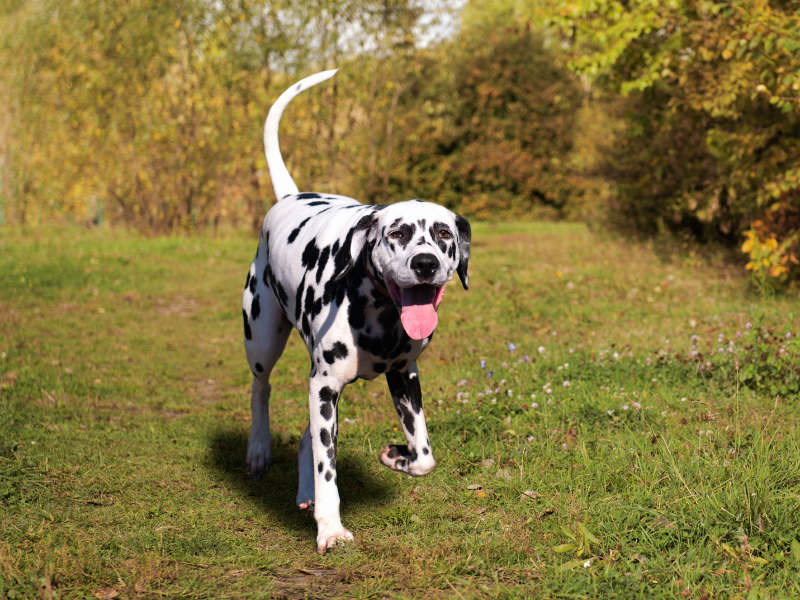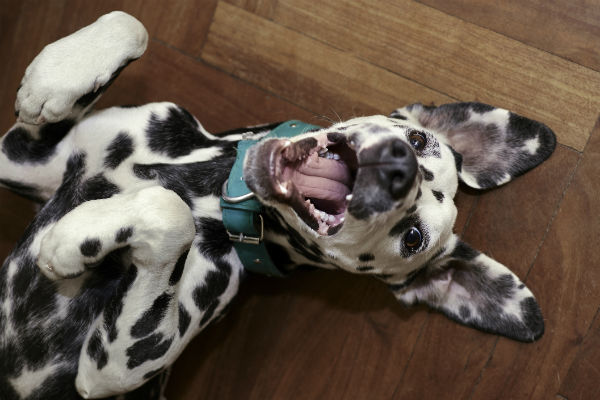Dalmatians, known for their distinctive spots and striking appearance, are often associated with firehouses and Disney movies. But did you know that these beautiful dogs also make excellent farm companions? With their origins dating back to ancient times, Dalmatians were originally bred to help farmers guard their livestock and property. Their strong protective instincts, high energy levels, and innate intelligence make them well-suited for farm life.
Dalmatians have a long history of working alongside farmers, proving their worth as versatile and reliable farm dogs. Their athletic build and endurance allow them to keep up with the demands of a hardworking farm, while their natural prey drive makes them excellent at keeping pests at bay. Additionally, their friendly and outgoing nature make them great with other animals, including horses and livestock. Whether it’s herding, guarding, or simply being a loyal companion, Dalmatians can bring both practicality and charm to any farm setting.

Do Dalmatians Make Good Farm Dogs?
In this article, we will explore the question of whether Dalmatians make good farm dogs. Dalmatians are known for their striking coat and energetic personality, but how well do they fit in with the demands of farm life? We will delve into the characteristics of Dalmatians, their suitability for farm work, and the factors to consider before bringing a Dalmatian onto a farm. So, let’s get started!
The History and Characteristics of Dalmatians
Dalmatians have a rich history that dates back hundreds of years. Originally bred as carriage dogs, they accompanied horse-drawn carriages and served as guard dogs. They are medium-sized dogs with a distinctive coat consisting of white fur marked with black or liver-colored spots. Dalmatians are known for their high energy levels, intelligence, and loyalty.
Their athleticism and endurance make them well-suited for various tasks, including herding, guarding, and even hunting. While their reputation as firehouse mascots is widely recognized, their abilities as farm dogs are often overlooked. Let’s dive into the specifics.
Dalmatians are highly trainable and versatile dogs, which can make them suitable for farm work. Their energy and intelligence allow them to learn quickly and adapt to various tasks. These dogs thrive in an environment where they can channel their energy and utilize their problem-solving skills. However, before considering a Dalmatian as a farm dog, it is important to evaluate certain factors.
The Challenges of Farm Life for Dalmatians
Although Dalmatians have many positive qualities that make them potential farm dogs, several challenges need to be considered. Firstly, their high energy levels require regular physical exercise and mental stimulation. Without proper outlets for their energy, Dalmatians may become bored or exhibit destructive behavior.
Farm work can provide opportunities for exercise, but it may not be sufficient for meeting the needs of a Dalmatian. Additional activities such as running, agility training, and interactive play sessions are essential for maintaining their physical and mental well-being.
Another challenge is the Dalmatian’s sensitivity to extreme weather conditions. Their short coat does not provide adequate protection from the cold. During the winter months, it is important to provide shelter and warmth for these dogs, especially in regions with harsh climates.
Additionally, Dalmatians are known to have a strong prey drive. They may be prone to chasing small animals or livestock if not properly trained and socialized. This instinctual behavior can pose a risk to the safety of other farm animals. Early socialization and consistent training are vital to ensure that the Dalmatian can coexist peacefully with other animals on the farm.
Despite these challenges, with the right training, care, and environment, Dalmatians can excel as farm dogs. Let’s explore some of the benefits they can bring to the farm.
The Benefits of Dalmatians as Farm Dogs
One of the main benefits of having a Dalmatian as a farm dog is their natural protective instincts. These dogs are known to be alert and will readily bark to alert their owners of any potential threats or intruders. Their loyalty and watchful nature can help keep the farm and its inhabitants safe.
Dalmatians are also excellent companions. Their friendly and outgoing demeanor allows them to bond with their human family members and other animals on the farm. They can provide emotional support and enhance the overall atmosphere of the farm.
Moreover, their intelligence and trainability make Dalmatians highly adaptable to various farm tasks. They can be trained to assist in herding livestock, guarding property, or even participating in search and rescue operations. Their athleticism and agility also enable them to navigate through uneven terrains, making them valuable assets in farm operations.
Lastly, Dalmatians’ striking appearance can add to the aesthetic appeal of a farm. Their unique coat pattern and elegant posture make them an eye-catching breed that can attract visitors and add character to the farmstead.
Tips for Owning a Dalmatian on a Farm
Before bringing a Dalmatian onto a farm, here are some important tips to consider:
- Provide ample opportunities for exercise, such as regular walks, runs, and engaging play sessions.
- Ensure the Dalmatian has access to shaded areas and fresh water during hot weather to prevent heatstroke.
- Invest time in training and socialization, especially with other farm animals, to minimize chasing or aggressive behavior.
- Consider the Dalmatian’s need for mental stimulation and provide puzzle toys or interactive games.
- Regularly groom the Dalmatian to keep their coat and skin healthy, as well as to minimize shedding.
- Monitor their interactions with visitors and strangers, as Dalmatians can be protective of their owners and territory.
Dalmatians vs. Other Farm Dog Breeds: A Comparison
While Dalmatians have their strengths as farm dogs, it is important to consider how they compare to other popular farm dog breeds. Let’s take a look at a comparison table:
| Characteristic | Dalmatians | Border Collies | Australian Shepherds |
|---|---|---|---|
| Energy Level | High | Very High | High |
| Size | Medium | Medium | Medium |
| Trainability | High | Very High | High |
| Herding Instinct | Moderate | Very High | Very High |
| Adaptability to Climate | Requires Shelter in Extreme Weather | Can Adapt to Various Climates | Can Adapt to Various Climates |
| Prey Drive | High | Low | Moderate |
Considerations When Choosing a Farm Dog
When choosing a farm dog, it is essential to consider the specific needs and requirements of your farm. Here are some key factors to consider:
- The type of farming activities you engage in: Different farms have varying needs, whether it’s herding, guarding, or other tasks.
- The temperament and compatibility of the dog with farm animals, children, and other pets.
- The size and space available on the farm for the dog to roam and exercise.
- The climate of your region and the dog breed’s ability to adapt to it.
- The time and resources you can allocate to training, grooming, and overall care of the dog.
Conclusion
When considering whether Dalmatians make good farm dogs, it is important to evaluate their unique characteristics, the challenges they may face, and the benefits they bring to the farm. While Dalmatians have the potential to thrive in a farm setting with proper training, socialization, and care, it is crucial to meet their exercise and mental stimulation needs. By understanding their peculiarities and ensuring a suitable environment, Dalmatians can indeed be valuable and cherished farm companions.
Key Takeaways: Do Dalmatians Make Good Farm Dogs?
- Dalmatians can make good farm dogs if properly trained and socialized.
- They are energetic and can excel in tasks such as herding and guarding livestock.
- Dalmatians are known for their agility and endurance, making them suitable for active farm lifestyles.
- They have a strong instinct to protect their territory, which can be beneficial on a farm.
- However, they may require consistent training and exercise to prevent boredom and destructive behavior.
Frequently Asked Questions
Curious about whether dalmatians are suited for farm life? Look no further! We’ve got the answers to your questions about dalmatians as farm dogs.
1. Are dalmatians good at herding livestock on a farm?
Dalmatians are not traditionally used for herding livestock. They are better known for their role as carriage dogs and firehouse mascots. While they may have the drive and endurance to chase after animals, their lack of herding instinct may make it challenging for them to effectively manage livestock on a farm.
However, every dog is an individual, and there might be some dalmatians who show potential as herding dogs with proper training and guidance. If you’re considering using a dalmatian for this purpose, it would be important to evaluate the specific dog’s temperament and willingness to learn.
2. Do dalmatians have the necessary qualities to protect a farm?
Dalmatians are generally known for their sociable and friendly nature, which may not make them the best guard dogs for a farm. Their friendly disposition and lack of strong protective instincts make them more likely to greet strangers with wagging tails rather than serve as fierce protectors.
While they may not excel in guarding duties, dalmatians can still be watchful and alert dogs. Their distinctive appearance and loud bark can help deter intruders and alert their human companions to any unusual activity. However, if your primary goal is to have a dog specifically for protection, there might be other breeds better suited to that role.
3. Can dalmatians adapt to the various tasks and environments of farm life?
Dalmatians are generally adaptable dogs and can thrive in many different environments, including farms. They have a history of being versatile working dogs, which can translate well to the demands of farm life.
However, it’s important to consider that dalmatians are a high-energy breed and require regular exercise and mental stimulation. Without proper outlets for their energy, they may become bored and develop behavioral issues. Ensuring they have enough physical activity and mental engagement on a farm can help them lead a happy and fulfilling life.
4. Are dalmatians prone to any health concerns that could affect their farm work?
Dalmatians are generally a healthy breed, but they are known to be prone to certain health issues that could impact their ability to perform farm work effectively. One of the well-known health concerns in dalmatians is deafness, which affects a significant percentage of the breed.
This hearing impairment could limit their ability to respond to commands or react to potential dangers on the farm. Additionally, dalmatians are also prone to urinary issues, such as bladder stones, which may require special care and management on a farm where access to proper veterinary care may be more limited.
5. What are some alternative farm dog breeds if dalmatians aren’t the best fit?
If dalmatians don’t seem like the best match for your farm, there are plenty of other dog breeds that are well-suited to farm life. Some popular choices include:
– Border Collies: Known for their herding abilities and intelligence.
– Australian Shepherds: Energetic and versatile working dogs.
– Labrador Retrievers: Hardworking and friendly, with a strong retrieving instinct.
– German Shepherds: Intelligent, protective, and versatile.
Each of these breeds brings its own unique traits and strengths to the farm, so it’s important to research and consider which breed aligns best with your specific needs and preferences.

The truth about Dalmatians | Beautiful dog breed
Summary
Dalmatians can make good farm dogs if they are properly trained and socialized. They have the energy and agility to keep up with the demands of farm work. However, their strong prey drive and independent nature may require extra supervision and training.
It’s important to remember that every dog is unique, and some Dalmatians may not be well-suited for farm life. It’s crucial to consider their individual temperament and needs before deciding if they will thrive in a farming environment. Regular exercise, mental stimulation, and a loving home are essential for raising a happy and well-adjusted Dalmatian farm dog.
